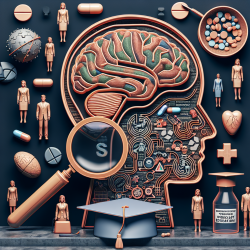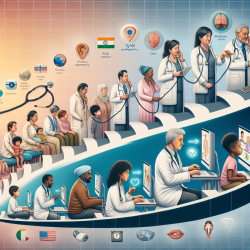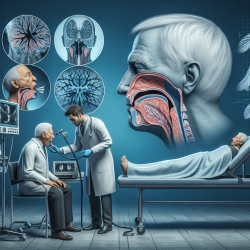Introduction
As professionals in speech-language pathology, we are constantly seeking innovative methods to enhance our practice and improve outcomes for children. The recent research article, Teaching Targeted Drug Discovery and Development to Healthcare Professionals by Fruchter et al., provides valuable insights into how targeted drug discovery education can be integrated into healthcare training. This blog post explores how the findings from this research can be applied to speech-language pathology, encouraging practitioners to expand their knowledge and skills.
The Importance of Drug Discovery Education
Drug discovery and development (DDD) is a critical component of translational research, which aims to apply laboratory discoveries to clinical practice. Despite its significance, formal training in DDD is often lacking in medical and biomedical education. The research highlights the need for structured educational programs to equip healthcare professionals with the necessary skills to engage in drug discovery, ultimately leading to improved therapeutic interventions.
Relevance to Speech-Language Pathology
While drug discovery might seem distant from speech-language pathology, the interdisciplinary nature of DDD offers valuable lessons. Understanding the mechanisms of drug action and development can enhance our approach to therapy, particularly in cases involving neurological or pharmacological interventions. By integrating knowledge from DDD, speech-language pathologists can better collaborate with medical professionals, ensuring comprehensive care for children with complex needs.
Implementing Educational Programs
The article outlines the development of the Health Innovations and Therapeutics concentration, which provides a model for integrating DDD education into healthcare training. Speech-language pathologists can benefit from similar programs that focus on:
- Understanding the science of drug development and its implications for therapy.
- Gaining insights into regulatory issues and clinical trial design.
- Collaborating with industry and government for innovative therapeutic solutions.
These programs can be tailored to include modules specific to speech-language pathology, such as the impact of pharmaceuticals on speech and language development.
Encouraging Further Research
For practitioners interested in advancing their skills, engaging in further research is crucial. The article suggests several steps to foster collaboration and innovation in DDD, which can be adapted for speech-language pathology:
- Participating in academic-industry-government roundtables to facilitate dialogue and collaboration.
- Developing core competencies and educational programs in collaboration with stakeholders.
- Exploring opportunities for hands-on research and practical experience in drug development.
By embracing these strategies, speech-language pathologists can contribute to the development of new therapies and interventions, ultimately enhancing outcomes for children.
Conclusion
The integration of targeted drug discovery education into speech-language pathology offers a promising avenue for professional development and improved therapeutic outcomes. By leveraging the insights from the research by Fruchter et al., practitioners can expand their knowledge, engage in collaborative research, and contribute to the advancement of the field. For those interested in exploring this further, the original research paper provides a comprehensive overview of the educational landscape in DDD.
To read the original research paper, please follow this link: Teaching Targeted Drug Discovery and Development to Healthcare Professionals.










